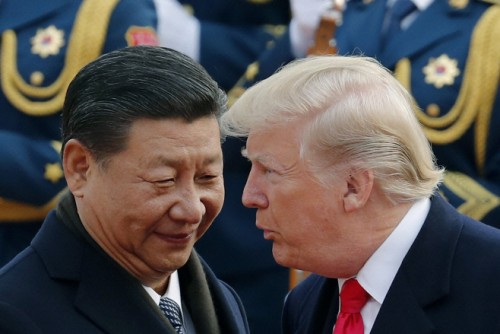 |
| U.S. President Donald Trump (right) speaks with Chinese President Xi Jinping during a welcoming ceremony at the Great Hall of the People in Beijing on November 9, 2017. / AP-Yonhap |
U.S. President Donald Trump and Chinese President Xi Jinping are likely to hold a summit either ahead of or during the Asia-Pacific Economic Cooperation (APEC) summit in Gyeongju this October, the South China Morning Post (SCMP) reported on July 20.
Quoting multiple sources, SCMP said the APEC summit scheduled for October 30 to November 1 would be an ideal opportunity for the two leaders to meet. Trump may visit China before the APEC meeting or hold a bilateral summit with Xi on the sidelines of the event.
Xi is reportedly planning to attend the summit, while Trump’s attendance has not been officially confirmed. However, senior U.S. officials view Trump’s participation as highly likely, according to SCMP.
If Trump visits China before APEC, he may choose Shanghai or another city over Beijing, where he made a state visit in early November 2017, to mark a contrast in diplomatic optics.
During their first official phone call since Trump’s return to the presidency on June 5, Xi invited the Trumps to visit China. Trump responded by inviting Xi to visit the United States.
Separately, U.S. Secretary of State Marco Rubio held his first face-to-face meeting with Chinese Foreign Minister Wang Yi on July 11 in Kuala Lumpur, Malaysia, during the East Asia Summit (EAS) and ASEAN Regional Forum (ARF). Rubio told reporters that both sides were eager for a summit and were seeking a mutually agreeable date.
SCMP described the Rubio-Wang meeting as a significant step toward a potential summit between the two leaders.
The meeting could lead to a wide-ranging agreement on key U.S.-China issues including tariffs, fentanyl exports, rare earth materials, and semiconductors.
At their first round of trade talks in Geneva on May 10–11, the U.S. and China agreed to sharply reduce tariffs for 90 days—bringing U.S. tariffs on Chinese goods down to 30% and Chinese tariffs on U.S. goods down to 10%. During the second round of talks in London on June 9–10, both sides agreed to lift some export controls: China would ease its rare earth export restrictions to the U.S., while the U.S. would relax certain technology export controls.
However, with the tariff truce set to expire on August 12, no further negotiation rounds have been announced or reported.
Despite this, recent developments suggest quiet progress. China's rare earth exports rose 32% in June, and the Trump administration approved exports of Nvidia’s H20 AI chip to China—moves seen as laying groundwork for a potential trade deal.
Chinese Commerce Minister Wang Wentao said on July 18 that China hopes to stabilize trade relations with the U.S. and views the Geneva and London talks as proof that a tariff war is unnecessary, according to Reuters.
Wang emphasized that U.S.-China relations remain interdependent, urging Washington to act with the responsibility expected of a global superpower.
Still, SCMP noted that issues like tensions over Taiwan and hardline anti-China factions within the U.S. could complicate summit arrangements.
Most Read
-
1
-
2
-
3
-
4
-
5
-
6
-
7





















